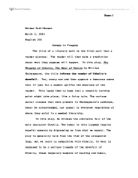Mak as a character of comic variety and adaptable possibilities, directs audience expectation, hope and subversive glee. He is a bold character who enacts, personifies, the Christian paradox's reversal of hierarchical patterns. Not in philosophical terms, but rather a performance in cultural terms, Bakhtin recognizes such riddling prophecy as fundamental to carnivalesque reversal as “an expression of the artistic and ideological tendency of the time, seeking to hear the sounds of the world in a new key, to approach it not as a somber mystery play but as a satirical drama”. With his satirical performance, Mak defies the social restraints that both heightens and dismantles the hierarchy of Christmas. His performance in a new comedy key conflates rigidified classes’ oppositions and spiritual possibility.
Further, as Mak is the chief comic character in the play, his entrance itself signals the birth of comic situation. When the play begins with a series of complaints by the shepherds, Mak’s entrance provides some relief. As Maynard Mack, Jr. put it: “The suffering world without hope depicted at the beginning is shattered by Mak and all he implies” (81). Mak is immediately portrayed as a trickster. He tries one thing after another to manipulate the shepherds with his fake southern accent. However, Mak is skilled at imitating southern English accents and striking a fatuous stance in response to the shepherds' rough treatment:
What! ich be a yoman,
I tell you, of the kyng,
The self and the some,
Sond from a greatt lordyng,
And sich. (Wakefield 291-95)
Of course, the shepherds do not believe him but they are somewhat amused. Mak’s absurdity make them feel superior, yet it gives them an uneasy feeling.The shepherds regard Mak as a source of amusement, but they are also aware that he is capable of robbing them of their meager possessions. Shepherds recognize Mak as a member of the local peasant culture. They are both familiar with Mak personally and are aware of petty criminal image. And despite this Mak succeeds in robbing the shepherds.
Mak quickly returns to his crime scene in order to divert attention from his theft. Later in order to prove his innocence Mak narrates his fake dream:
I thoght Gyll began to crok
And travell full sad,
Wel-ner at the fyrst cok,
Of a yong lad
For to mend oure flok. (Wakefield 556-60)
He swears by “Sant Stevyn” (Wakefield 553) to further associates the Christ’s birth’s feast time with the literal roasted lamb feast with Gyll, waiting for him at home. Here, Mak’s quick departure, expression of distress and innocence claims combine theatrically and somewhat suspiciously— to return him to his cottage. Mak’s movement from the cover up scene to the scene of his crime comically associates both without realizing that his humble abode will also be a scene of paradoxical revelation.
With all the urgency of incarnation Mak and Gyll enact their cover up while the shepherds search for the stolen sheep. Gyll pointedly shows of her intensified distress:
If ever I you begyld,
That I ete this chylde
That lyges in this credyll. (Wakefield 772-76)
Here Mak’s response, “Peasse, woman, for Godys payn, / And cry not so!” (Wakefield 777-78) at once represents both a desperate theatrical injunction, “Don’t mention the cradle!”, and recognition of a paradoxical anguish in which he will be more and more involved. Mak’s growing discomfort enlivens comic farce while revealing salvational wonder paradoxically.
Mak's part, however, is over with the discovery of stolen sheep. That is, it has come to an end in Mak's character. However, with the sudden arrival of the Angel critics such as Helterman details Mak’s cottage parallel staging with the nativity scene while using same setting for both the scenes and by placing Marry in a position roughly similar to Gyll’s and by using the cradle that the sheep had just vacated as the Christ's crib. Mak has only one place left: a suitable epiphanic place for one who often complains about fatherhood and pretends to be a lamb’s father. Shockingly but appropriately, Mak doubles Joseph. As always, Mak is again centrally, profoundly, comically involved. From the very beginning, Mak looking for a role, announces blissful human ignorance: “Thi will, Lorde, of me tharnys” (Wakefield 277), his initial distress is clarified here: “Now wold God I were in heven, / For the[r] wepe no barnes” (Wakefield 280-81). Mak realizes that he has been there all along, much like the shepherds with their anachronistic apostrophes.
Through dialogical parody, Mak's ludicrous-sacrosanct act of stealing and concealment becomes a paradoxical act of revelation and generosity. Enter the comic hero, who anyone can relate to. Through Mak Wakefield asserts the carnivalized theatre and abolishes the authoritarian shame. Mak doubles as human facilitator, yet conveyed through the New Testament Gospels, his energies suggest carnivalised subversion, graceful intervention and radical reform. As Rick Bowers observes, “Anyone who can accept the story of the virgin birth, the remarkable star, and the wise men can accept Mak’s ironic performance.”
Works Cited
Bakhtin, Mikhail. The Dialogic Imagination. Trans. Caryl Emerson and Michael Holquist. Austin: U of Texas P, 1981.
Bowers, Rick. Comedy, Carnival, and Grace: The Performance of Mak in the Second Shepherds’ Play. ESC English Studies in Canada. 2002.
Helterman, Jeffrey. Symbolic Action in the Plays of the Wakefield Master. Athens: U of Georgia P, 1981.
Mack, Maynard, Jr. “The Second Shepherds’ Play: A Reconsideration.” PMLA 93 (1978): 78-85.
Roney, L. (1983). The Wakefield First and Second Shepherds Plays as Complements in Psychology and Parody. Speculum: A Journal of Medieval Studies, 58(3), 696-723.








